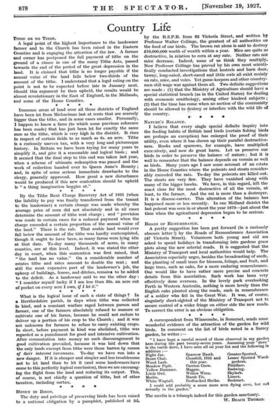What is the logical issue of such a state of
things ? In a Hertfordshire parish, in days when tithe was collected in kind, and a constant warfare raged between parson and farmer, one of the fariners absolutely refused to manure or cultivate one of his farms, because he could not endure to deliver up a portion of his crop to the Church ; and it was not unknown for farmers to refuse to carry existing crops.
In short, before payment in kind was abolished, tithe was regarded as a punishment for good and intensive cultivation.
After commutation into money no such discouragement to good cultivation prevailed, because it was laid down that the only lands exempt from tithe were those barren by reason of their inherent barrenness. To-day we have run into a new danger. If it is cheaper and simpler and less troublesome not to let land than to let it (and some landowners have come to this perfectly logical conclusion), then we are encourag- ing the flight from the land and reducing its output. This, of course, is not chiefly a question of tithe, but of other
taxation, including surtax.














































 Previous page
Previous page